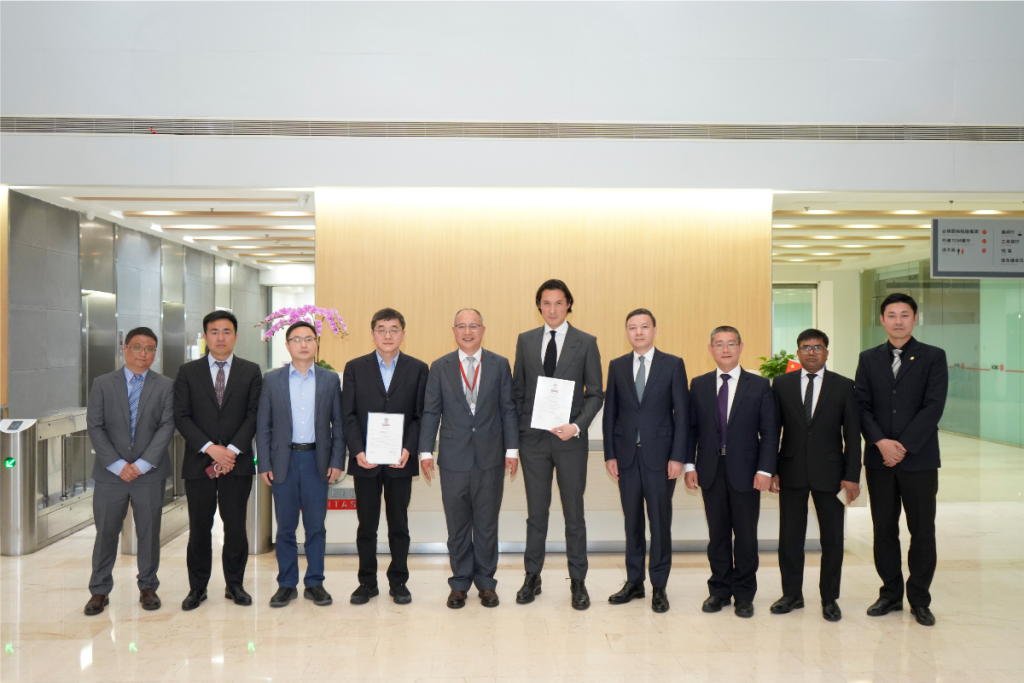
Bureau Veritas (BV), a world leader in testing, inspection, and certification, has delivered an Approval in Principle (AiP) to Wah Kwong Maritime Transport Holdings, a Hong Kong shipowner, and Qiyao Environmental Technology (Qiyao Environ Tec), a subsidiary of Shanghai Marine Diesel Engine Research Institute, for a carbon capture and storage (CCS) project onboard two Wah Kwong vessels.
The AiP, which was delivered at a ceremony held at BV’s Shanghai office, follows a joint study led by BV, Wah Kwong, and Qiyao Environ Tec, which validated the technical feasibility of using CCS technology on existing vessels as a measure to ensure compliance with the IMO’s Carbon Intensity regulation.
Based on the specific design parameters of the vessels, Qiyao Environ Tec developed a customized design of a CCS unit for the two vessels. The CCS unit has passed laboratory tests, achieving over 85% CO2 capture from the exhaust gas flow, and is being continuously optimized and upgraded. The system is based on an organic amine solution that extracts CO2 from the exhaust gas before it is cooled into liquid form and stored in a low-temperature storage tank.
The study showed that CCS enabled the two vessels to remain compliant by upgrading and maintaining their CII rating at a C level until 2030. It considered all aspects of retrofit space, operational impact, CAPEX and OPEX, as well as the upcoming EU ETS, to assess the future investment and revenue expectations for each vessel.
BV provided comprehensive support for the project, from vessel selection in the early stages of the project to the design layout of the CCS system on board, certification, and cost analysis. BV reviewed the plans according to existing regulations and rules to ensure the safety of the vessels and equipment and validate that the carbon emission reduction targets are effectively achieved during the operation of the vessels.
The project aims to support the future commercial application of CCS technology in the maritime sector, providing a clear analysis to guide decision-making by ship owners and related parties, especially for older vessels in operation.
Hing Chao, Executive Chairman of Wah Kwong, said: “With regulations such as the IMO’s CII and the EU ETS coming into force for shipping, it is essential to ensure compliance and to reduce the carbon footprint of existing vessels for years to come. Carbon capture and storage technology is one of the net-zero solutions currently available. Wah Kwong takes a holistic approach to sustainability and is proud to work with Bureau Veritas and Qiyao Environmental Technology on this pioneering application of CCS for the maritime sector, which is now validated with the issuance of an AiP. We hope this would encourage further studies or advance implementation of the CCS technology.”
Mr. Jianfu DONG, President of Shanghai Qiyao Environmental Technology Co. Ltd., said: “Carbon capture and storage technology has been available for several decades, notably in industrial projects on shore, but only recently have we started to deploy its considerable potential for the maritime industry. We are proud to receive this Approval in Principle from Bureau Veritas, which confirms the viability of our carbon capture technology as a retrofit solution to reduce CO2 emissions from existing ships. Our hope is that this innovative project will also help spur the development and implementation of CCS technology in shipping more broadly.”
Alex Gregg-Smith, Senior Vice President & Chief Executive, North Asia and China at Bureau Veritas Marine & Offshore, said: “At BV, we are committed to supporting shipping stakeholders in their decarbonization journeys, helping our clients comply with environmental regulations, implementing green solutions onboard, and measure decarbonization progress. In an era of fast-evolving regulations and technology, the independent expertise of classification societies will help shipowners identify the best solutions for their ships, taking into account the practicalities of fleet operations. This project is a great example of collaboration, with all parties coming together to ensure the safe development and deployment of technology that will support more sustainable shipping.”







